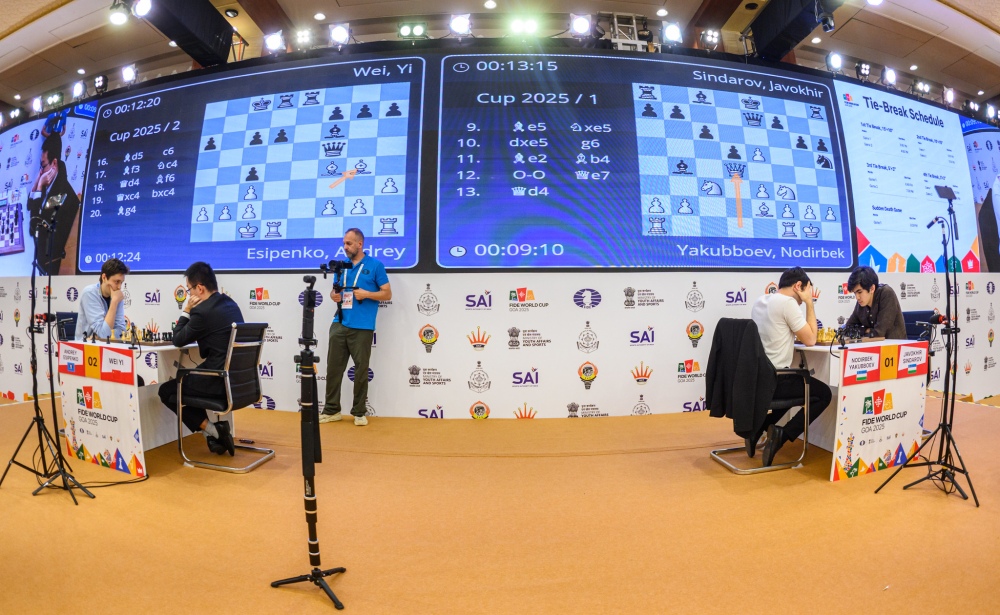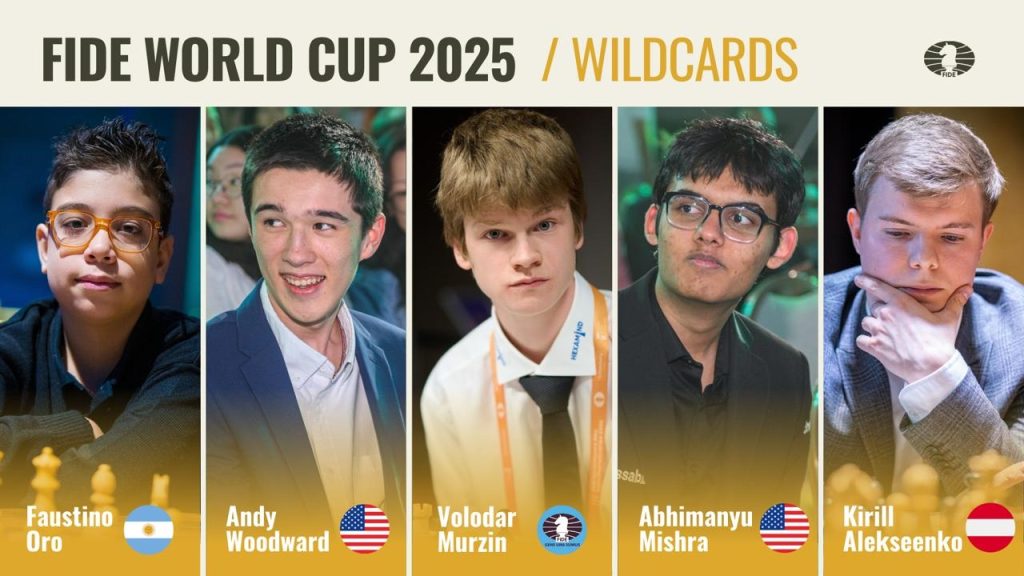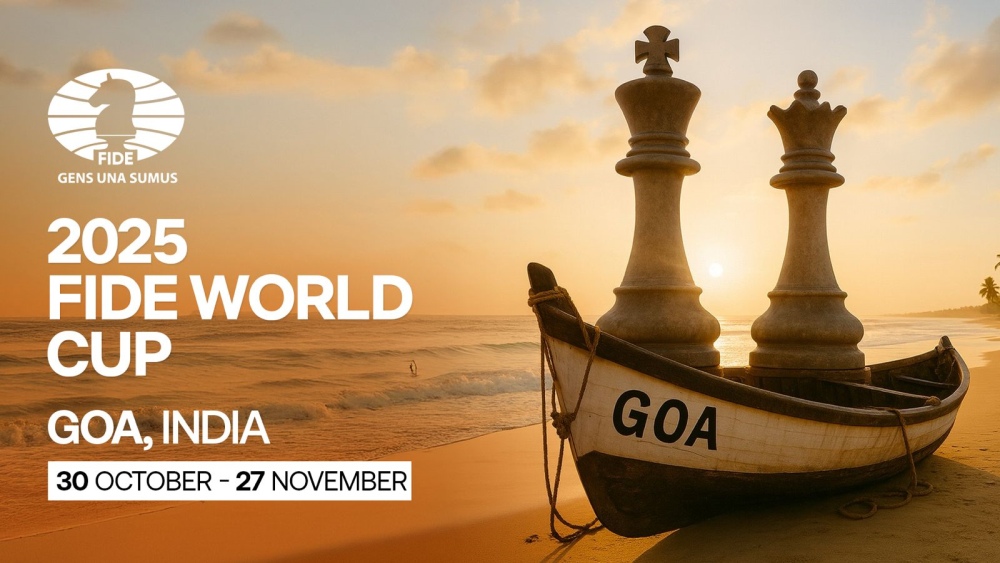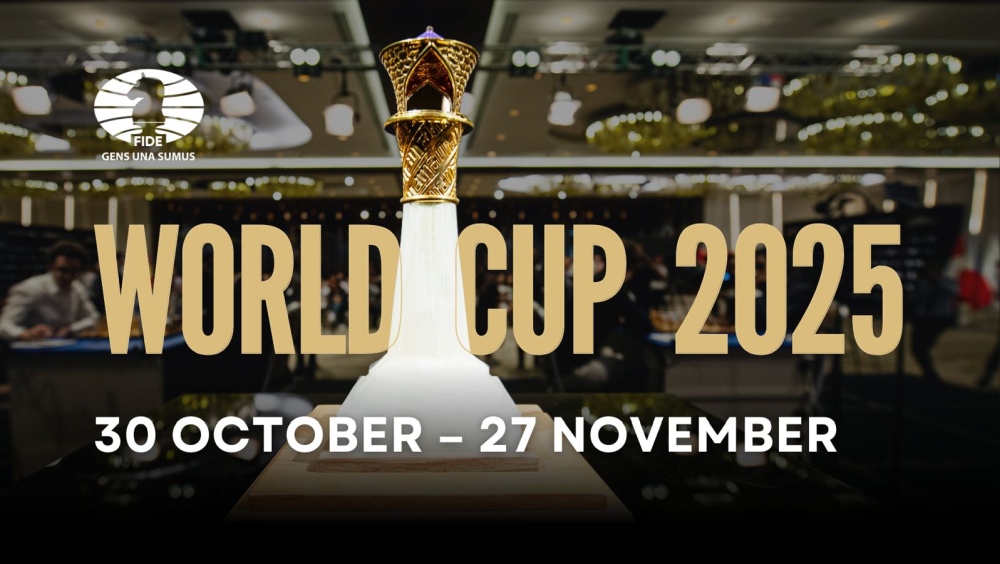FIDE World Cup: Sindarov and Wei Yi advance to final after dramatic tiebreaks

It was the quickest day at the FIDE World Cup so far, with both semifinal tiebreak matches ending in the first 15+10 rapid portion. The day concluded by 16:45, but the speed did not diminish the drama. In the match between Javokhir Sindarov and Nodirbek Yakubboev, Sindarov’s preparation paid off as he took the first rapid game converting a winning endgame. The second game was more tense, with Yakubboev finding real chances to strike back, but the players eventually drew, sending Sindarov through as the first player to reach the finals as well as the 2026 FIDE Candidates. On the opposite side of the stage, the match between Andrey Esipenko and Wei Yi was a rollercoaster from beginning to end. Wei Yi, considered the favourite, obtained winning chances as Black in the first game but ultimately drew. In the second rapid game, it was Esipenko who held the advantage until a fateful rook blunder reversed the outcome and cost him the match. It was a shocking end to the semifinal tiebreaks. The ceremonial first move was made by Mr. Sadanand Shet Tanavade, Member of Parliament (Rajya Sabha), on the board between Sindarov and Yakubboev. Throughout the event, it has been encouraging to see the interest shown by government officials and the AICF’s efforts to invite distinguished guests to each game. At 15:00, the silence of the hall shifted to the quick tapping of clocks. Unlike the classical games, all players seemed settled from the very first moves, confidently blitzing out their opening choices. Here is a closer look at how the games unfolded: Semifinals tiebreak results: Andrey Esipenko ½–1½ Wei YiJavokhir Sindarov 1½–½ Nodirbek Yakubboev Javokhir Sindarov (2721) vs Nodirbek Yakubboev (2689) Javokhir Sindarov is only a few rating points away from becoming the top player in Uzbekistan. As The Guardian recently described, he is “on the verge” of the world elite, and he demonstrated that level today by starting the semifinal tiebreaks with a win over Nodirbek Yakubboev with the Black pieces. The first game began in a typical Semi-Slav structure, following a sideline known for its solidity. Both players appeared well prepared, but they soon diverged from known theory. Up to that point they had played accurately, but White, already behind on time throughout the game, made several imprecise decisions that allowed Black to take over. In a closed position with both sides holding two rooks, White with a bishop, and Black with a knight, Sindarov used the flexibility of his knight to maneuver it into strong squares on the queenside. This eventually forced the bishop-knight exchange, leaving Black with a superior pawn structure. In the resulting position, Black controlled the board with active rooks pressing against White’s isolated e-pawn. With less than a minute remaining, Yakubboev was forced to defend resourcefully. Sindarov did not find an immediate finishing blow, but he eventually secured two connected passed pawns on the queenside. With no realistic defensive chances left, Yakubboev resigned, placing himself in a must-win situation with Black in the second rapid game. Their second 15+10 game began in a Sicilian Najdorf and quickly turned chaotic after White launched an early kingside pawn storm. A key psychological moment came when Sindarov spent nine minutes on 12.f4. Our studio commentators, Grandmasters Peter Leko and Jan Gustafsson, pointed out that this may have caused Yakubboev to relax slightly and choose the wrong plan. White gained an advantage, and Black soon had to give up the exchange, relying on the bishop pair to create counterplay. As is often the case in this time control, chances swung back and forth. Sindarov lost his advantage for a moment, and suddenly Black stood better with real hope of staying in the event. But a major mistake changed the evaluation again. Although White did not convert perfectly and allowed equality more than once, he eventually steered the game into a draw. Here, Black should ignore the potential discovered check on the d-file and play something like 26…Bg2, followed by 27.Bxe3+ Kc6 28.Rh2 Bf3. The position remains equal but requires accuracy from White. Instead, Yakubboev played 26…Kc8?, moving the king away from danger but shutting off his rook and giving White a +3 advantage. Sindarov was not fully precise in converting, exchanging winning chances for equality several times, but a final liquidation to a draw was enough to secure his place in the finals and the 2026 FIDE Candidates. Sindarov was delighted after the match, though he expressed sadness for his teammate, noting that Yakubboev had played well. In our interview, he spoke proudly about his performance today and shared that his family, including his brother, had traveled to Goa to support him, bringing Uzbek food and sweets to lift his spirits. It seems to be working. Andrey Esipenko (2693) vs Wei Yi (2752) Wei Yi looked markedly different after winning the tiebreak against Andrey Esipenko today, especially given the stroke of luck that helped him not just survive the second game but win it. First, let’s revisit the opening rapid game, where the Chinese grandmaster once again started strongly, echoing his match against Arjun Erigaisi, where he recovered from a difficult classical phase with much stronger play in the tiebreaks. With the Black pieces, the game repeated yesterday’s Petroff Defense with the lesser-played 7.Be4, but this time Wei Yi had improved preparation and adopted a slightly different move order, confidently emerging with a better position. In the final stage of the game, a crucial moment appeared: Both players were low on time, and this last move by White was inaccurate. Black had the strong 33…Bd6, forcing the bishops off the board due to the threat of …c5, leading to a centralised king after 34.Bxd6 Kxd6 and real winning chances. Instead, Wei opted for 33…Bf4, and after 34.Re2 Be5, the players repeated moves and drew the game. A steady Italian Game started their second rapid encounter. For a long time, the position seemed dry, with no clear attacking prospects and a stable 0.0 evaluation. Then White
A new generation of chess players gets an invite for the FIDE World Cup

Rising stars and top performers Faustino Oro, Andy Woodward, Abhimanyu Mishra and Volodar Murzin will join well-known GM Kirill Alekseenko at the FIDE World Cup this November in India. FIDE President Arkady Dvorkovich has officially granted the invitations for this year’s FIDE World Cup, which will take place in Goa from 30th October to 27th November. The World Cup will be a unique chance for these top talents to compete in one of the most prestigious tournaments on the chess calendar. Among the players are Americans Abhimanyu Mishra (the youngest player in history to become a Grandmaster) and Andy Woodward (this year’s winner of the Junior’s Closed US Championship) who had a spectacular run at the recent FIDE Grand Swiss in Samarkand, finishing 5th and 7th respectively. World Rapid Champion, 19-year-old Volodar Murzin, who is on the path of reaching 2700 ELO (currently at 2670), also got an invite, alongside 28-year-old Kirill Alekseenko (representing Austria), a participant of the 2020/21 Candidates tournament and a well-known player at strong individual and team events. The youngest joiner is 11-year-old Faustino Oro, the Argentinian prodigy often called the “Messi of Chess” and considered one of the most promising young talents in the game. “FIDE always works hard to find ways to give talented players a chance to improve and make their mark. The decision to award invites to these five players is based on a mix of recent performance, high-level potential and their contribution to the sport,” FIDE President Arkady Dvorkovich said. “The World Cup is one of the most difficult and most exciting chess events, given its knockout format, and will be a great opportunity for these players to show their best facing the best,” Dvorkovich added. There is one more invitation place to be decided before the World Cup starts in November. The FIDE World Cup takes place every two years, lasts for three weeks, and is one of the hardest chess tournaments to win. It features 206 top world players competing in a knock-out format consisting of mini-matches. At stakes are not just the title or the prizes but, crucially, three top spots leading to the Candidates tournament where the challenger for the title of World Champion will be determined.
FIDE World Cup 2025 heads to Goa, India

The FIDE World Cup 2025 is coming to Goa! From October 30 to November 27, 2025, the world’s top players will gather on India’s west coast for one of the most exciting chess events. This knockout spectacle brings together 206 players fighting for a share of USD 2,000,000 and three coveted places in the 2026 Candidates Tournament. Every round is win-or-go-home, making the World Cup one of the most dramatic tournaments on the calendar. Why Goa? Goa’s stunning beaches, vibrant culture, and warm hospitality makes it an exciting backdrop for this global showdown. Players and fans will experience world-class chess alongside a destination famous for its energy and charm. India’s connection to chess runs deep, and in recent years the country has become a global force, producing top players and hosting significant tournaments. Last year, Gukesh Dommaraju became the World Champion, whilst Indian teams won the Chess Olympiad in both Open and Women categories. The momentum continued: this July, the Women’s World Cup saw a standout performance by Divya Deshmukh, who lifted the trophy and captured worldwide attention. Staging the Open World Cup in Goa builds on these successes and gives local fans an opportunity to watch their stars compete against the very best on home soil. Arkady Dvorkovich, FIDE President: “India has become one of the strongest chess nations, with outstanding players and passionate fans. After the success of the FIDE Women’s World Cup held in Georgia earlier this year, we are proud to bring the FIDE World Cup to Goa. It will be a celebration of chess, and a unique experience for players and spectators from around the world. The representatives of 90+ countries are expected to take part, and it will be one of the most followed events in chess history.” Narendra Modi, Prime Minister of India: “India is delighted to be hosting the prestigious FIDE World Cup 2025 and that too after over two decades. Chess is gaining popularity among our youth. I am sure this tournament will witness thrilling matches and showcase the brilliance of top players from around the world.” Nitin Narang, AICF President: “This is a proud moment for Indian chess, and we are committed to delivering an event that reflects both the passion of our fans and the professionalism of our federation. The World Cup will not only inspire millions across the country but also showcase India’s growing stature as a global hub for chess. We are deeply thankful to FIDE for granting India the honor of hosting the World Cup 2025 in Goa.” Key Details Dates: 31 October to 27 November 2025 Venue: Goa, India Players: 206 Format: Eight-round knockout Top 50 seeds enter from Round 2 Matches are two classical games, with rapid and blitz playoffs if tied Candidates spots: Top three finishers qualify for the 2026 Candidates Tournament List of qualified players: worldcup2025.fide.com/participants/ Regulations for FIDE World Cup 2025 (PDF) With Goa confirmed as the host city, anticipation is building for an unforgettable month of high-stakes chess. Stay tuned for more information. The countdown to the FIDE World Cup 2025 has officially begun!
FIDE World Cup 2025 to be hosted in India

The FIDE World Cup is coming to India this year! Scheduled for October 30 to November 27, 2025, the tournament will feature the world’s best players battling for the coveted title and qualification spots in the 2026 FIDE Candidates Tournament. Format The FIDE World Cup 2025 will feature 206 players competing in a knockout format—a dynamic and unpredictable system where the losing player in each round is eliminated. The event has used several formats over the years, but since 2021, it has followed a single-elimination format. Each round spans three days: two classical games on the first two days, followed by tie-breaks on the third day, if necessary. In the first round, the top 50 players receive byes, while players seeded from 51 to 206 compete, with pairings based on the principle of the top half versus the reversed lower half. What’s at stake? The top three finishers of the 2025 World Cup will earn direct qualification for the 2026 Candidates Tournament, which determines the challenger for the World Chess Championship. Qualification Paths Players can qualify for the World Cup through various avenues, including: Reigning World Champion as of June 1, 2025 Top four finishers from the FIDE World Cup 2023 Reigning Women’s World Champion as of June 1, 2025 2024 World Junior Champion U-20 Spots Africa Americas Asia Europe Granted 3 3 3 3 Top 8 juniors 0 0 6 2 Top 60 players 0 9 26 25 Total 3 12 35 30 Qualifiers from Continental events, accounting for 80 spots The highest-rated players in the June 2025 FIDE standard rating list, 13 players, who have not qualified by any of the above listed path Top 100 national federations from the 2024 Chess Olympiad open section, each receiving one spot 4 nominees of the FIDE President 2 nominees of the Organiser Detailed information on qualification can be found in the official FIDE handbook. India: A chess powerhouse This year’s World Cup being held in India is particularly exciting. India has become a dominant force in the chess world, thanks in part to five-time World Champion and FIDE Deputy President Viswanathan Anand, whose efforts and legacy have been instrumental in popularizing chess in the country. India’s young stars include Gukesh Dommaraju, who became the youngest FIDE World Chess Champion at 18, Praggnanandhaa R, the runner-up of the 2023 World Cup, and Arjun Erigaisi, currently ranked world number five. In 2024, both the Indian Open and Women’s teams claimed their first-ever gold medals at the Chess Olympiad—a historic achievement further highlighted by four individual gold medals won by Gukesh, Erigaisi, Deshmukh, and Agrawal. Additionally, Koneru Humpy secured gold at the 2024 FIDE Women’s Rapid Championship, and Vaishali Rameshbabu earned bronze at the 2024 FIDE Women’s Blitz Championship. Photo: Stev Bonhage India has also recently hosted major events, including the FIDE Chess Olympiad 2022, Tata Steel Chess India, the FIDE World Junior U20 Championships 2024, and the 5th leg of the FIDE Women’s Grand Prix (April 2025). These accomplishments underscore India’s status as a global chess hub, making it a fitting venue for the FIDE World Cup 2025. FIDE CEO Emil Sutovsky expressed his excitement: “We are thrilled to bring the FIDE World Cup 2025 to India, a country with a deep-rooted passion and support for chess. Indian chess fans’ enthusiasm has always been remarkable, and we anticipate great interest in the event among local chess lovers, both on-site and online. To enhance the experience, FIDE is committed to organizing numerous side events, featuring tournament participants and chess legends.” Further details, including the announcement of the host city, will be released in due course. FIDE looks forward to an exhilarating tournament that continues to celebrate and advance the game of chess worldwide. The list of qualified players: https://worldcup2025.fide.com/participants/